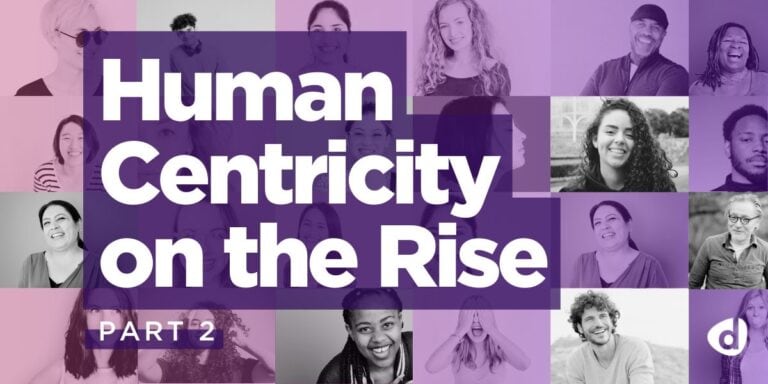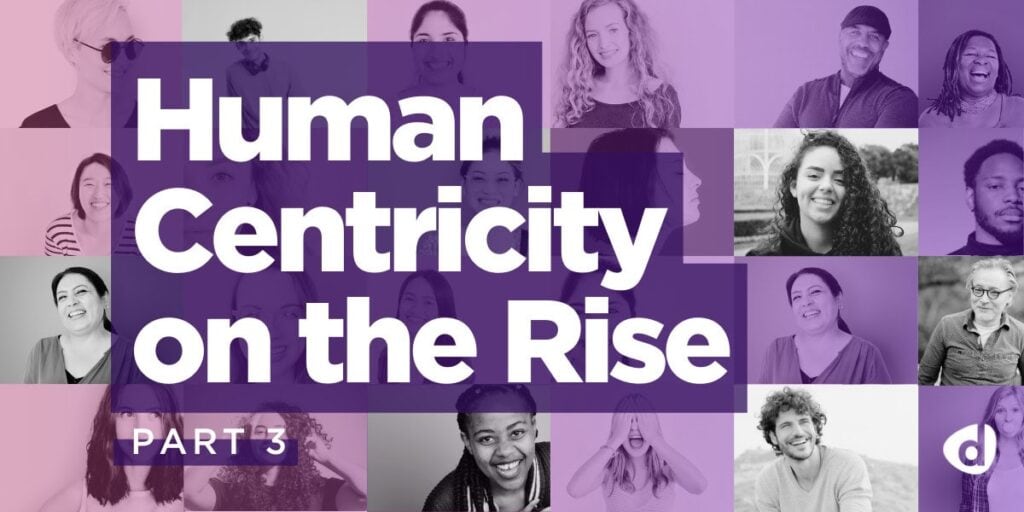Human Centricity on the Rise: Navigating the New Era, Part 2

Explore the strategies driving success as global leaders prioritize human centricity in future-proofing consumer insights
In the first blog of this series, I discussed the key insights from the 2024 GRIT Insights Practice Report, shedding light on the emerging trends and challenges that are expected to shape the future of consumer insights in qual. In this blog, I’ll be sharing perspectives from some of our industry conversations with insights leaders from PepsiCo, Edgewell Personal Care, and Reckitt, providing a firsthand look at how these leading global organizations are cracking the code on evolving consumer behaviors, and their strategies for staying ahead of the curve.
A focal point of all of these discussions has been the growing emphasis on scaling human centricity to bring consumer voices to the forefront of strategic business decisions. Let’s take a look at how these leading brands are navigating this new era.
PepsiCo: The case for change as a human-centric organization
With Sioned Winfield, Senior Director of Global Insights & Marketing Capabilities at PepsiCo
In this recent TMRE@Home presentation, we joined Sioned Winfield from PepsiCo as she discussed the increasing importance for PepsiCo to deeply understand consumer desires amid rapidly evolving needs, preferences, and trends.
Sioned shared that over the past several years, digitalization has driven disruption in the way PepsiCo has historically done business. Shopping is happening in more places. Purchases are fragmented. Consumers are more in control of what they see, and algorithms are gaining more power and increasingly determining what people are exposed to.
Large global organizations, like PepsiCo, need to connect with humans in a more regular and agile way – conducting more in-depth conversations, having those conversations faster, doing them better and less expensively, while also solving for the problem that traditionally, empathy work has been:
- Expensive
- Subjective
- Time-consuming
- Hard to interpret
“We needed to think differently about what we do and how we do it. In the past, we’ve aimed our muscle of consumer centricity much more to making people want things, rather than making things people want.”
Sioned Winfield
Senior Director of Global Insights & Marketing Capabilities at PepsiCo
PepsiCo is leading in this new era as they have shifted their vision to being a human-centric food and beverage company firmly embedded in the lives of those that they serve – thinking of people beyond what they buy and rather as multifaceted humans navigating through life’s changes and stages.
I believe we will continue to see large global organizations following PepsiCo’s lead in innovating to become increasingly human-centric.
Edgewell: Leveraging GenAI to make human-centric decisions, faster
With Julie Katz, Senior Manager of Global Consumer Insights at Edgewell Personal Care
In this recent Insight Platforms webinar, I joined Julie Katz, Senior Manager of Global Consumer Insights, to discuss the ways in which GenAI is helping Edgewell Personal Care unlock human-centric insights faster than ever before.
Edgewell, like many other global organizations, is quite familiar with the lengthy time it takes to obtain meaningful consumer insights with traditional methods’ reliance on manual data processing and analysis.
Julie and I spoke about the value Edgewell sees in GenAI tools for accelerating insights generation:
- Automating tasks that traditionally require significant human effort and time.
- While human intelligence is still needed to activate the insights, Edgewell saves time by leveraging GenAI to analyze unstructured data and extract meaningful insights from large volumes of text, like transcripts from focus groups or interviews.
- While human intelligence is still needed to activate the insights, Edgewell saves time by leveraging GenAI to analyze unstructured data and extract meaningful insights from large volumes of text, like transcripts from focus groups or interviews.
- Speeding up the research process.
- With GenAI-powered summaries, themes, and direct quotes instantaneously extracted from consumer conversations, Edgewell can make decisions faster and spend more time on things like business strategy.
- With GenAI-powered summaries, themes, and direct quotes instantaneously extracted from consumer conversations, Edgewell can make decisions faster and spend more time on things like business strategy.
- Real-time refinement instead of a reactive approach.
- By leveraging quick GenAI-powered insights following initial interviews, Edgewell has unlocked a new level of agility in refining conversations and can confidently make timely adjustments to interview questions or the interview structure.
Julie mentioned, “Discuss’ GenAI tools speed up our processes and save us a significant amount of time, which is a huge win.” Learn more about how Edgewell is driving agile insights and next gen strategies with GenAI tools in this case study.
Ultimately, leveraging GenAI has empowered Edgewell to expedite their time-to-insights and stay ahead of the curve in understanding consumer behaviors to make human-centric decisions.
Julie and I also explored the future potential of GenAI in enhancing human-centric insights and agreed that GenAI tools, when utilized effectively, enable faster, better, and more cost-effective human centricity at scale.
Reckitt: Using a DIY approach to human centricity
With Katie Angier, Global Consumer Insight Lead of Innovation & HCP
In our presentation with Reckitt at Quirk’s London this year, Katie Angier, Global Consumer Insight Lead of Innovation & HCP, spoke about the importance of a human-centric mindset in driving the success of global brands.
Katie shared how Reckitt recognizes that the human element is worth so much more than data points on a spreadsheet and that exposure to consumers’ stories enables global organizations to more powerfully embed humans’ needs into business decisions.
Reckitt’s uses an innovative DIY approach to build a consumer-first mindset throughout the entire organization by ensuring that stakeholders are emotionally engaged with the consumer stories and that these stories guide them in making decisions rooted in the genuine needs of their consumers.
A Human-Centric Product Launch
In the Quirk’s London presentation, Katie spoke about a specific product launch where Reckitt leveraged a DIY approach in preparation for the international launch of its breakthrough IBS management brand, Fybocalm.
Initially, the organization gathered extensive quantitative insights to inform the launch, but these data points didn’t give life to the emotional side of their target audience, IBS-sufferers.
To humanize the data, Reckitt utilized Discuss’ self-capture asynchronous tool to collect personal stories of real IBS sufferers to understand the emotional impact of their suffering.
Katie shared that Reckitt received stories that were impossible to not empathize with. These empathy-driven insights ensured that Reckitt approached the launch with a consumer-first mindset as the sufferers’ responses informed the launch support plans, brought faces and quotes in front of key stakeholders and made the stories more memorable and agitating that solely quant data.
Not only did this DIY approach prove successful for the launch – as Fybocalm is now the #2 IBS brand after being on the market for only eight months (as of May 2024) – but it also speaks to how this human-centric approach is shaping a future where market research is synonymous with human connection and understanding.
Conclusion
It’s clear that PepsiCo, Edgewell, and Reckitt are at the forefront of leading this new era – from PepsiCo’s shift towards understanding consumers beyond transactions to Edgewell’s adoption of GenAI for generating faster human-centric insights, and Reckitt’s innovation in embedding consumer voices into business strategies – each show the value of putting consumers at the center of the organization.
It excites me as I see market research not only informing but deeply connecting with human experiences. In my conversations and engagements within the industry this year, it’s clear that consumer insights are no longer just data points – they are the heartbeat of strategic decision-making. And the stakes are high. The future is held by those who recognize that embracing human centricity isn’t just a great advantage, but that it’s critical for staying ahead in this new era.
I invite you to talk to an expert today to transform your insights into powerful, human-centric strategies that drive action and deliver results.
About Jim Longo:
Jim Longo is the Co-Founder and Chief Strategy Officer at Discuss, a purpose-built qualitative research platform for insights teams. He brings 35 years of domain expertise in the market research industry. Jim has consulted with brands and research agencies around the world on how to have insightful online conversations. Jim is considered a thought leader with regards to online behavior and market research technology. Connect with Jim on LinkedIn.
Ready to unlock human-centric market insights?
Related Articles

Why Your Business Needs a Multicultural Marketing Strategy
A recent Ad Age article highlights a notable trend that some companies are taking a stand to keep DEI at…
A recent Ad Age article highlights a notable trend that some companies are taking a stand to keep DEI at…

Human Centricity on the Rise: Navigating the New Era, Part 3
How to unlock human centricity at scale with a key mindset shift In Part 1 of this blog series, I…
How to unlock human centricity at scale with a key mindset shift In Part 1 of this blog series, I…

Empathy & Human Centricity Design | Discuss
By Adam Mertz, Chief Growth Officer at Discuss Introduction I recently had the opportunity to moderate a compelling discussion between…
By Adam Mertz, Chief Growth Officer at Discuss Introduction I recently had the opportunity to moderate a compelling discussion between…
